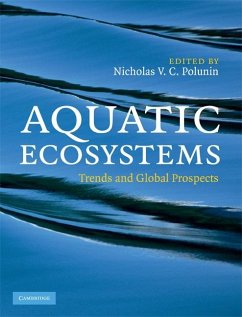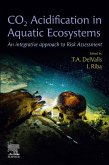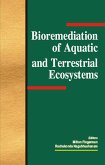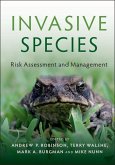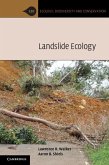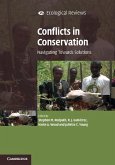Aquatic Ecosystems (eBook, ePUB)
Trends and Global Prospects
Redaktion: Polunin, Nicholas V. C.


Alle Infos zum eBook verschenken

Aquatic Ecosystems (eBook, ePUB)
Trends and Global Prospects
Redaktion: Polunin, Nicholas V. C.
- Format: ePub
- Merkliste
- Auf die Merkliste
- Bewerten Bewerten
- Teilen
- Produkt teilen
- Produkterinnerung
- Produkterinnerung

Hier können Sie sich einloggen

Bitte loggen Sie sich zunächst in Ihr Kundenkonto ein oder registrieren Sie sich bei bücher.de, um das eBook-Abo tolino select nutzen zu können.
Concern about future supplies of fresh water to society, to meet the full range of human needs, now comes very high on the priority list of global societal issues. An overarching issue, which this book addresses, is whether global climate change is a dominant driver of change in the structure and function of all natural water-based ecosystems, or whether direct human population growth and accelerated consumption are playing an equal or greater role. This book divides the whole aquatic realm into 21 ecosystems, from those on land (both saline and fresh water) to those of the open and deep…mehr
- Geräte: eReader
- mit Kopierschutz
- eBook Hilfe
- Größe: 6.66MB
- FamilySharing(5)
![CO2 Acidification in Aquatic Ecosystems (eBook, ePUB) CO2 Acidification in Aquatic Ecosystems (eBook, ePUB)]() CO2 Acidification in Aquatic Ecosystems (eBook, ePUB)117,95 €
CO2 Acidification in Aquatic Ecosystems (eBook, ePUB)117,95 €![Biogeoscience Approach to Ecosystems (eBook, ePUB) Biogeoscience Approach to Ecosystems (eBook, ePUB)]() Biogeoscience Approach to Ecosystems (eBook, ePUB)54,95 €
Biogeoscience Approach to Ecosystems (eBook, ePUB)54,95 €![Bioremediation of Aquatic and Terrestrial Ecosystems (eBook, ePUB) Bioremediation of Aquatic and Terrestrial Ecosystems (eBook, ePUB)]() Bioremediation of Aquatic and Terrestrial Ecosystems (eBook, ePUB)63,95 €
Bioremediation of Aquatic and Terrestrial Ecosystems (eBook, ePUB)63,95 €![Foundations for Sustainability (eBook, ePUB) Foundations for Sustainability (eBook, ePUB)]() Daniel A. FiscusFoundations for Sustainability (eBook, ePUB)64,95 €
Daniel A. FiscusFoundations for Sustainability (eBook, ePUB)64,95 €![Invasive Species (eBook, ePUB) Invasive Species (eBook, ePUB)]() Invasive Species (eBook, ePUB)33,95 €
Invasive Species (eBook, ePUB)33,95 €![Landslide Ecology (eBook, ePUB) Landslide Ecology (eBook, ePUB)]() Lawrence R. WalkerLandslide Ecology (eBook, ePUB)34,95 €
Lawrence R. WalkerLandslide Ecology (eBook, ePUB)34,95 €![Conflicts in Conservation (eBook, ePUB) Conflicts in Conservation (eBook, ePUB)]() Conflicts in Conservation (eBook, ePUB)30,95 €
Conflicts in Conservation (eBook, ePUB)30,95 €-
-
-
Dieser Download kann aus rechtlichen Gründen nur mit Rechnungsadresse in A, B, BG, CY, CZ, D, DK, EW, E, FIN, F, GR, HR, H, IRL, I, LT, L, LR, M, NL, PL, P, R, S, SLO, SK ausgeliefert werden.
- Produktdetails
- Verlag: Cambridge University Press
- Erscheinungstermin: 11. September 2008
- Englisch
- ISBN-13: 9781316171783
- Artikelnr.: 52918846
- Verlag: Cambridge University Press
- Erscheinungstermin: 11. September 2008
- Englisch
- ISBN-13: 9781316171783
- Artikelnr.: 52918846
- Herstellerkennzeichnung Die Herstellerinformationen sind derzeit nicht verfügbar.
people
fisheries and aquatic ecosystems Robert Engelman
Daniel Pauly
Dirk Zeller
Ronald G. Prinn
John K. Pinnegar and Nicholas V. C. Polunin; Part I. Flowing Waters: 2. Prospects for streams and rivers: an ecological perspective Björn Malmqvist
Simon D. Rundle
Alan P. Covich
Alan G. Hildrew
Christopher T. Robinson and Colin R. Townsend; 3. Groundwater ecosystems: human impacts and future management Janine Gibert
David C. Culver
Dan L. Danielopol
Christian Griebler
Amara Gunatilaka
Jos Notenboo and Boris Sket; 4. Flood plains: critically threatened ecosystems Klement Tockner
Stuart E. Bunn
Christopher Gordon
Robert J. Naiman
Gerry P. Quinn
Jack A. Stanford; Part II. Still Waters: 5. The future of small lakes and ponds Brian Moss
Christer Brönmark
Glen George
Lars-Anders Hansso and Erik Jeppesen; 6. Environmental trends and potential future states of large freshwater lakes Alfred M. Beeton
Robert E. Hecky and Kenton M. Stewart; 7. Salt lakes: values
threats
and future Robert Jellison
William D. Williams (deceased)
Brian Timms
Javier Alcocer and Nikolay V. Aladin; Part III. Freshwater Wetlands: 8. The future of cool temperate peatlands Nils Malmer
Peter D. Moore and Michael C. F. Proctor; 9. Temperate freshwater wetlands: response to gradients in moisture regime
human alterations and economic status Mark M. Brinson
Barbara E. Bedford
Beth Middleton and Jos T. A. Verhoeven; 10. Present state and future of tropical wetlands Brij Gopal
Wolfgang J. Junk
C. Max Finlayson and Charles M. Breen; Part IV. Coastal Wetlands: 11. Saltmarsh Paul Adam
Mark D. Bertness
Anthony J. Davy and Joy B. Zedler; 12. Future of mangrove ecosystems to 2025 Richard S. Dod and Jin E. Ong; 13. Environmental future of estuaries Michael J. Kennish
Robert J. Livingston
Dave Raffaelli and Karsten Reise; Part V. Rocky Shores: 14. Rocky intertidal shores: prognosis for the future George M. Branch
Richard C. Thompson
Tasman P. Crowe
Juan Carlos Castilla
Olivia Langmead and Stephen J. Hawkins; 15. Current status and future trends in kelp forest ecosystems Robert S. Steneck
Rodrigo H. Bustamante
Paul K. Dayton
Geoffrey P. Jone and Alistair J. Hobday; 16. Projecting the current trajectory for coral reefs Tim R. McClanahan
Robert W. Buddemeier
Ove Hoegh-Guldberg and Paul Sammarco; Part VI. Soft Shores: 17. Sandy shores of the near future Alexander C. Brown (deceased)
Karl F. Nordstrom
Anton McLachlan
Nancy L. Jackson and Douglas J. Sherman; 18. Seagrass ecosystems: their global status and prospects Carlos M. Duarte
Jens Borum
Frederick T. Short and Diana I. Walker; 19. Continental shelf benthic ecosystems - prospects for an improved environmental future Stephen J. Hall
Stuart I. Rogers and Simon F. Thrush; Part VII. Vast Marine Systems: 20. The marine pelagic ecosystem: perspectives on humanity's role in the future Peter G. Verity
John H. Steele
T. Frede Thingstad and Fereidoun Rassoulzadegan; 21. Polar and ice-edge marine systems Andrew Clarke
Andrew S. Brierley
Colin M. Harris
Dan Lubin and Raymond C. Smith; 22. The near future of the deep seafloor ecosystems Craig R. Smith
Lisa A. Levin
Anthony Koslow
Paul A. Tyler and Adrian G. Glover; 23. Synthesis: Trends and global prospects of the Earth's aquatic ecosystems Nicholas V. C. Polunin
Brij Gopal
Nicholas A. J. Graham
Stephen Hall
Venugopalan Ittekkot and Annette Mühlig-Hofmann.
people
fisheries and aquatic ecosystems Robert Engelman
Daniel Pauly
Dirk Zeller
Ronald G. Prinn
John K. Pinnegar and Nicholas V. C. Polunin; Part I. Flowing Waters: 2. Prospects for streams and rivers: an ecological perspective Björn Malmqvist
Simon D. Rundle
Alan P. Covich
Alan G. Hildrew
Christopher T. Robinson and Colin R. Townsend; 3. Groundwater ecosystems: human impacts and future management Janine Gibert
David C. Culver
Dan L. Danielopol
Christian Griebler
Amara Gunatilaka
Jos Notenboo and Boris Sket; 4. Flood plains: critically threatened ecosystems Klement Tockner
Stuart E. Bunn
Christopher Gordon
Robert J. Naiman
Gerry P. Quinn
Jack A. Stanford; Part II. Still Waters: 5. The future of small lakes and ponds Brian Moss
Christer Brönmark
Glen George
Lars-Anders Hansso and Erik Jeppesen; 6. Environmental trends and potential future states of large freshwater lakes Alfred M. Beeton
Robert E. Hecky and Kenton M. Stewart; 7. Salt lakes: values
threats
and future Robert Jellison
William D. Williams (deceased)
Brian Timms
Javier Alcocer and Nikolay V. Aladin; Part III. Freshwater Wetlands: 8. The future of cool temperate peatlands Nils Malmer
Peter D. Moore and Michael C. F. Proctor; 9. Temperate freshwater wetlands: response to gradients in moisture regime
human alterations and economic status Mark M. Brinson
Barbara E. Bedford
Beth Middleton and Jos T. A. Verhoeven; 10. Present state and future of tropical wetlands Brij Gopal
Wolfgang J. Junk
C. Max Finlayson and Charles M. Breen; Part IV. Coastal Wetlands: 11. Saltmarsh Paul Adam
Mark D. Bertness
Anthony J. Davy and Joy B. Zedler; 12. Future of mangrove ecosystems to 2025 Richard S. Dod and Jin E. Ong; 13. Environmental future of estuaries Michael J. Kennish
Robert J. Livingston
Dave Raffaelli and Karsten Reise; Part V. Rocky Shores: 14. Rocky intertidal shores: prognosis for the future George M. Branch
Richard C. Thompson
Tasman P. Crowe
Juan Carlos Castilla
Olivia Langmead and Stephen J. Hawkins; 15. Current status and future trends in kelp forest ecosystems Robert S. Steneck
Rodrigo H. Bustamante
Paul K. Dayton
Geoffrey P. Jone and Alistair J. Hobday; 16. Projecting the current trajectory for coral reefs Tim R. McClanahan
Robert W. Buddemeier
Ove Hoegh-Guldberg and Paul Sammarco; Part VI. Soft Shores: 17. Sandy shores of the near future Alexander C. Brown (deceased)
Karl F. Nordstrom
Anton McLachlan
Nancy L. Jackson and Douglas J. Sherman; 18. Seagrass ecosystems: their global status and prospects Carlos M. Duarte
Jens Borum
Frederick T. Short and Diana I. Walker; 19. Continental shelf benthic ecosystems - prospects for an improved environmental future Stephen J. Hall
Stuart I. Rogers and Simon F. Thrush; Part VII. Vast Marine Systems: 20. The marine pelagic ecosystem: perspectives on humanity's role in the future Peter G. Verity
John H. Steele
T. Frede Thingstad and Fereidoun Rassoulzadegan; 21. Polar and ice-edge marine systems Andrew Clarke
Andrew S. Brierley
Colin M. Harris
Dan Lubin and Raymond C. Smith; 22. The near future of the deep seafloor ecosystems Craig R. Smith
Lisa A. Levin
Anthony Koslow
Paul A. Tyler and Adrian G. Glover; 23. Synthesis: Trends and global prospects of the Earth's aquatic ecosystems Nicholas V. C. Polunin
Brij Gopal
Nicholas A. J. Graham
Stephen Hall
Venugopalan Ittekkot and Annette Mühlig-Hofmann.
